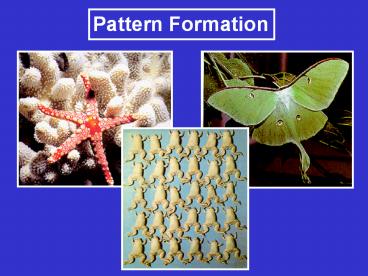Pattern formation PowerPoint PPT Presentation
1 / 47
Title: Pattern formation
1
Pattern Formation
2
Morphallaxis
Remodeling of tissue into a whole new organism
No new cell division
Hydra
Fig. 18.25, pg. 580
3
Epimorphosis
Addition of a part to the whole New growth
and cell division
Salamander
Fig. 18.19, pg. 574
4
(No Transcript)
5
Proposed Mechanisms for Pattern Formation
- Morphogen Gradient
- Haptotaxis Induction of cell growth
- Thermodynamic (Temporal) Model
6
Limb Field
7
Blastema
Regeneration
8
Fig. 16.3, pg. 507
9
Dorsal
Posterior
Distal
Proximal
Anterior
Ventral
10
Limb Outgrowth
11
Differential Control of 3 Axes
12
Chick Wing
Fig. 16.1, pg. 506
13
Wing
Fibroblast Growth Factor FGFs 12 genes with
100s of protein isoforms
Fig. 16.9, pg. 511
14
Wing
Fibroblast Growth Factor FGFs 12 genes with
100s of protein isoforms
Fig. 16.9, pg. 511
15
(No Transcript)
16
FGF10 stabilized regionally by Wnt8c and Wnt2b
17
Fig. 16.19, pg. 519
18
Homeotic Hox genes Genes which regulate body
segmentation and proximal / distal differentiation
Similar to Fig. 16.14, pg. 515
19
Characteristics of Hox genes
- Mice and humans have 4 Hox clusters (a total
of 39 genes - in humans) located on 4 different
chromosomes.
- In humans HOXA, HOXB, HOXC, HOXD
- Act along the developing embryo in the same
sequence that they - occupy on the chromosome.
- All genes in the mammalian Hox clusters show
some sequence - homology to each other (especially in their
homeobox) but very - strong sequence homology to the equivalent
genes in Drosophila. - HoxB7 differs from Antp at only two amino
acids, HoxB6 at four.
- mouse HoxB6 gene inserted in Drosophila can
substitute for Antennapedia producing
legs in place of antennae
Conclusion?
20
Selector genes have retained, through millions of
years of evolution, function of assigning
particular positions in the embryo. The
structures actually built depend on a different
set of genes specific for a particular species.
Genetic Specificity
21
(No Transcript)
22
(No Transcript)
23
Humerus
Radius
Radius
Ulna
Ulna
Humerus
24
X-irradiate
Remove bud and transplant to non-irradiated host
Limb Bud
Result ?
25
Thalidomide exposure between D20 D36 of
pregnancy
Phocomelia
26
(No Transcript)
27
Fig. 16.13, pg. 514
28
Posterior
Distal
Proximal
Anterior
29
Anterior
Retinoic Acid
ZPA
Posterior
30
III
Chick Wing
Fig. 16.1, pg. 506
31
(No Transcript)
32
4
3
2
2
Results of Graft I
3
4
2
3
4
4
3
Results of Graft II
4
33
(No Transcript)
34
Experimental Design - ZPA
from hamster transplanted to chick limb bud
Possible Results ?
35
Fig. 16.18, pg. 518
36
Fig. 16.19, pg. 519
37
Sonic hedgehog (Shh) is the active agent
Fig. 16.16, pg. 516
38
Gene receptors for morphogen enhancer
39
Possible models of ZPA activity
40
Fig. 16.20, pg. 520
41
Fig. 16.21, pg. 521
42
Dorsal / Ventral Axis Determination
Wnt7a
Lmx1b
En1 transcription factor represses Wnt7a
expression in ventral ectoderm
Wnt7a deficient mice --- Duplication
of ventral tendons and footpads
Fig. 16.22, pg. 521
43
Summary of proposed events in limb formation
Fgf-10
Induction
Maintenance
44
Maintenance of Shh in dorsal ectoderm
Shh blocks cleavage of GLi3 to GLi3R creating a
gradient of GLi activator and GLi3 repressor
Gremlin blocks BMPs which inhibit FGFs
Fig. 16.23, pg. 522
45
Aptosis - Programmed cell death
Noggin protein expressed
No expression of BMP4 Due to Noggin expression
Expression of BMP4
Fig. 16.24, pg. 522
46
BMP class of genes first identified as genes
that stimulate bone formation - Bone
Morphogenetic Proteins -
BMPs now shown to induce chondrogenesis and
aptosis
Context Dependency - Response depends on
the age of the target cells
47
Trematode cysts developing in limb
bud field

